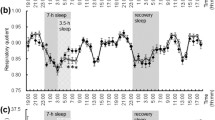Summary
-
1.
Polygraphic night sleep recordings in eight healthy male volunteers with simultaneous measurement of rectal temperature, plasma growth hormone (HGH), cortisol, and TSH concentrations were performed during normal, raised, and lowered ambient and body temperature.
-
2.
There was a statistically significant increase in plasma cortisol and TSH levels during cold nights with a smaller rise during high temperatures.
-
3.
Growth hormone levels, measured as the mean highest plasma concentration in the first two NREM-REM sleep cycles, were slightly lower during hot and cold nights than corresponding baseline values. It is suggested that there may be an inverse relation between ACTH and HGH secretion by the anterior pituitary gland.
-
4.
During the nights of high ambient temperature, decreased total duration of sleep and particularly low values of paradoxical sleep were observed. Night sleep in low ambient temperature with a significant decrease of body temperature is not different from baseline conditions.
-
5.
The results suggest that a pronounced increase in stress hormone secretion may occur without changes in polygraphic EEG criteria.
Zusammenfassung
-
1.
Bei 8 jungen männlichen Versuchspersonen wurden polygraphische Nachtschlafregistrierungen mit Messungen der Rektaltemperatur bei normaler, erhöhter und erniedrigter Umgebungs- und Körpertemperatur durchgeführt. Bestimmungen der Plasma-, Wachstumshormon-, Cortisol- und Thyreotropinsekretion wurden während des Schlafes durchgeführt.
-
2.
Sowohl in Nächten mit erniedrigter als auch erhöhter Umgebungs- und Körpertemperatur fand sich eine vermehrte Sekretion von Cortisol und TSH, die in der Kälte am deutlichsten war im Vergleich mit Indifferenztemperaturen.
-
3.
Die Maxima der Plasma Wachstumshormonkonzentrationen waren im thermisch belasteten Schlaf während der ersten beiden Zyklen leicht vermindert im Gegensatz zu Cortisol. Danach ist eine reziproke Beziehung zwischen ACTH und Wachstumshormonsekretion aus dem Hypophysenvorderlappen möglich.
-
4.
Die Gesamtschlafzeit und der Anteil an paradoxem Schlaf ist bei erhöhter Umgebungs- und Körpertemperatur deutlich vermindert, während der Schlaf in der Kälte normal ist.
-
5.
Die vermehrte Sekretion von Cortisol und Thyreotropin zeigt, daß eine erhöhte Freisetzung von “Streßhormonen” ohne Änderung im polygraphischen Schlafablauf vorkommen kann.
Similar content being viewed by others
References
Adamson, L., Hunter, W. M., Ogunremi, O. O., Oswald, I., Percy-Robb, J. W.: Growth hormone increase during sleep after daytime exercise. J. Endocr. 62, 473–478 (1974)
Alford, F. P., Baker, H. W. G., Burger, H. G., de Kretser, D. M., Hudson, B., Johns, M. W., Masterton, J. P., Patel, Y. C., Rennie, G. C.: Temporal patterns of integrated plasma hormone levels during sleep and wakefulness. Thyroid-stimulating hormone, growth hormone and cortisol. J. Clin. Endocr. Metab. 37, 841–847 (1973)
Beck, U., Brězinovà, V., Hunter, W. M., Oswald, I.: Plasma growth hormone and slow wave sleep increase after interruption of sleep. J. Clin. Endocr. Metab. 40, 812–815 (1975)
Cramer, H., Böhme, W., Kendel, K., Donnadien, M.: Freisetzung von Wachstumshormon und Melanozyten-stimulierendem Hormon in durch Melantonin gebahntem Schlaf beim Menschen. Arzneim. Forsch. (Drug Res.), in press
Frantz, A. G., Robkin, M. T.: Human growth hormone: clinical measurement, response to hypoglycemia and suppression by corticosteroids. New Engl. J. Med. 271, 1375–1378 (1964)
Ogunremi, O. O., Adamson, L., Brězinovà, V., Hunter, W. M., MacLean, A. W., Oswald, I., Percy-Robb, I. W.: Two anti-anxiety drugs: a psychoneuroendocrine study. Brit. med. J. II, 202–205 (1973)
Rechtschaffen, A., Kales, A.: A manual of standardized terminology and scoring system for sleep stages of human subjects. Bulletin 204, Bethesda, Md.: Public Health Service 1968
Sassin, J. F., Parker, D. C., Mace, J. W., Johnson, L. C., Rossmann, L. G.: Human growth hormone release: relation to slow wave sleep and sleep waking cycles. Science 165, 513–515 (1969)
Schmidt-Kessen, W., Kendel, K. Einfluß der Raumtemperatur auf den Nachtschlaf. Res. exp. Med. 160, 220–233 (1973)
Takahashi, Y., Kipnis, D. M., Daughaday, W. H.: Growth hormone secretion during sleep. J. clin. Invest. 47, 2079–2090 (1968)
Weitzmann, E. D., Schaumburg, H., Fishbein, W.: Plasma 17-hydroxycorticosteroid levels during sleep in man. J. clin. Endocr. 26, 121–126 (1966)
Author information
Authors and Affiliations
Rights and permissions
About this article
Cite this article
Beck, U., Reinhardt, H., Kendel, K. et al. Temperature and endocrine activity during sleep in man. Arch. F. Psychiatr. U. Z. Neur. 222, 245–256 (1976). https://doi.org/10.1007/BF02206620
Received:
Issue Date:
DOI: https://doi.org/10.1007/BF02206620




